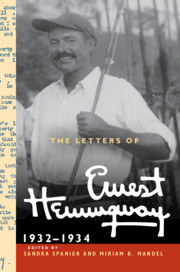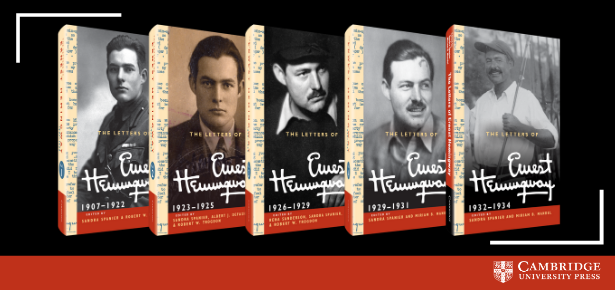
Ken Burns and Lynn Novick’s HEMINGWAY premieres on PBS on April 5, 2021.
Directed by acclaimed documentary filmmakers Ken Burns and Lynn Novick, written by Geoffrey C. Ward, and produced by Sarah Botstein, Burns, and Novick, HEMINGWAY is a production of Florentine Films and WETA, Washington, D.C. The three-part, six-hour film series explores the life and work of Ernest Hemingway and is coming to PBS April 5-7, 2021 8:00-10:00 p.m. ET (check local listings). Sandra Spanier, General Editor of The Letters of Ernest Hemingway, and Associate Editor Verna Kale have served as advisors on the film, which interweaves a close study of the biographical elements of the author’s life with passages from his published works and private writing, including excerpts from the Letters.
How did you get involved in HEMINGWAY?
Sandra:
In January 2016, I was contacted by Lynn Novick and invited to serve as an advisor to the film project. At the time we had just published Volume 3 of The Letters of Ernest Hemingway, and she said that she and the documentary team had been “utterly enthralled” with the first three volumes and eagerly awaited subsequent installments. I met with her and Sarah Botstein that April in Boston, where we had all traveled to attend the annual PEN/Hemingway award event at the Kennedy Library, to discuss the project in general terms. In the spring of 2018, Verna Kale and I were invited to read and comment on a complete draft of the script, then come to New York for a three-day advisory meeting, where we discussed it page by page and line by line. The following summer I took part in another advisory meeting in Walpole, New Hampshire, to view and respond to the rough cut of the film series, each of us filling a pad of legal-sized note paper with our running commentary of all six hours of the film. I have been impressed at every turn by the filmmakers’ attention to detail, their interest in listening and learning, and their respect for complexity and nuance as they crafted this documentary of the celebrated, complicated, and contradictory character that was Hemingway.
Verna: Producer Sarah Botstein and director Lynn Novick were featured at a plenary session of the Hemingway Society’s biennial international conference in 2016 in Oak Park, Illinois, and I moderated that session, along with John W. Berry of the Ernest Hemingway Foundation of Oak Park. The film was in its early stages of development then, but the panel discussed the kind of research that goes into the initial script as well as the visual elements that bring the subject to life on screen and how they achieve that famous Ken Burns aesthetic. I was thrilled when Lynn and Sarah later approached me about advising on Geoffrey C. Ward’s script.
In what ways did the filmmakers draw upon the Letters in the making of the film?
Sandra:
Hemingway’s letters are fundamental to telling the story of his life and work. His letters, which he never intended to be seen by anyone but the person he was writing to, are an unedited running record of his life and times–the raw material of biography and history. The HEMINGWAY documentary features excerpts from more than thirty of his letters and draws upon many more for context and background to the story the documentary tells. Many times throughout the process, we have been able to answer questions from the filmmakers by consulting letters in our master archive, and we have also pointed them to letters that we think they might want to quote or draw upon in order to illustrate a particular insight or illuminate a particular relationship that the film deals with.
Verna: Having access to the entirety of Hemingway’s correspondence gives us a certain holistic behind-the-scenes perspective and we were able to help weigh in on certain aspects of Hemingway’s personality and career that have been overlooked or misrepresented in the known published record and secondary scholarship. We also have a familiarity with the contents at major archives, like the John F. Kennedy Presidential Library in Boston, and could make suggestions about which manuscript materials or visual archives they might explore. The script editing session with Geoffrey Ward, the filmmakers, and other literary scholars was very collaborative.
What was it like being interviewed for the film?
Verna: As a kid growing up in the 1980s, I watched a lot of PBS. My fellow Gen X-ers know the particular delight of seeing the teacher roll the TV cart into the classroom. There’s also a part of me that has always equated being on PBS with being a public intellectual. The Florentine Films documentaries are an important example of the public humanities. It would not be an exaggeration to say that one of the main reasons I went to grad school in the first place was to contribute to that discourse–I always wanted to be what I called “a blah-blah person” talking about books on TV. The experience lived up to my anticipation. The interview was recorded in Manhattan and we had to pause every few minutes to wait for traffic sounds and sirens to die down or to touch up my makeup or to make adjustments to the lighting and sound equipment. All in all it took the better part of a day, and I think I appear in maybe about a minute total of the 6-hour film. Miriam B. Mandel (co-editor of Volumes 4, 5, and 6 of the Letters), also appears in the film, along with noted biographers, scholars, Hemingway’s son Patrick, and the late former U.S. Senator John McCain. It was an honor to be included.
Does the film contain any surprises?
Verna: It does! But I don’t want to reveal any spoilers so I’ll just say that there are sides to Hemingway that will surprise viewers. The filmmakers are very candid about his shortcomings, and yet ultimately I think people may find themselves with a new perspective on some of Hemingway’s private struggles. And as subsequent volumes of the Letters come out, they will confirm and complicate the themes the film explores.
What is next for the Letters Project?
Sandra:
Volume 5 was published in June 2020 and includes 393 items of correspondence directed to 100 correspondents spanning the period January 1932-May 1934. The letters in this volume cover the publication of Death in the Afternoon and Winner Take Nothing as Hemingway follows up on the success of A Farewell to Arms, the novel that cemented his literary reputation and his celebrity. The letters also chart his new passion for big-game fishing, his African safari and other travels, as well as his influential role in the establishment of Esquire, a new men’s interest magazine We are now immersed in Volume 6, which will span June 1934 through June 1936 and will include an Appendix of Earlier Letters that have come to light since publication of the previous volumes. We are also at work on Volume 7 (July 1936-December 1940), and we even have a team working ahead on the Final Volume in order to take advantage of the memories and knowledge of those who can still speak of Hemingway and his letters firsthand, including his son Patrick (born in 1928) and Valerie Danby-Smith Hemingway, who served as his secretary in the last years of his life (and later married his son Gregory).
https://www.pbs.org/video/ken-burns-hemingway-look-ahead/


Latest Comments
Have your say!